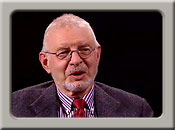UC Berkeley Web Feature
Rx for Social Security
Daniel McFadden: 'Some people are going to choose badly; then what?'
Media Relations recently spoke with Daniel McFadden, a Nobel laureate in economics and a UC Berkeley professor of economics who has researched and written extensively about behavioral economics, and about the financial conditions — including private retirement decisions, Social Security, Medicare and housing — of America’s elderly.
Q. How likely is it that taxes will be raised to support Social Security?
 Roll Tape: McFadden on Social Security |
A. I
think the politicians have been
very reluctant to propose any
kind of taxes … certainly
the political spirit of this
country seems to be going the
other way. I think, to some extent,
it's an illusion. You know the
slogans of the current administration:
'No new taxes, permanent tax
cuts.' Well, in fact, the taxes
you pay go for the services you
use.
So perhaps the Bush administration
slogan should be: 'No new services,
and permanent service cuts.' If
people really thought in terms
of whether that was what they really
wanted, that might well indeed
be what they choose to vote for.
At least they would be doing it
with a clear understanding of what
the trade-offs are, what the policy
options really are.
Q: What are the plusses and minuses of private accounts?
A. The first characteristic of a private account is your contributions are earmarked for you … and they will eventually pay your own benefits. As such, you have more of a proprietary right to those than [you have] in a sense now. You have the possibility that the private accounts might earn better interest. … The downside of the personal account is, first of all, unless it's very carefully designed, the administrative and management costs will be far, far higher than the current costs of running the Social Security system. The system now is very inexpensive to operate. Unless something really careful is done to control management fees, to aggregate [private] accounts together, unless those things are done … it's a system where the management costs are going to take a big bite out of the upside.
 'The downside of the personal account is, first of all, unless it's very carefully designed, the administrative and management costs will be far, far higher than the current costs of running the Social Security system.' -Daniel McFadden |
Q. You've done research on the economic status of elderly Americans. What have you found in terms of how well they prepare financially for retirement?
A. One of the things that we've learned about the elderly is that while many people are aware of what life will be like after they retire, a lot of people aren't. And they don't because they're in sufficiently stressed economic circumstances and, even despite their best intentions, they simply cannot get ahead. Others don't think about what retirement will be like, they don't save enough.
Right now, about 30 percent of the elderly have no assets, no retirement income other than Social Security … So these are people who don't own a house, they don't have equity, they don't have a savings account. Social Security for them is it. We want to be very cautious about anything that would happen to people who are currently in that system or will be in the next decade or so who have really not made provisions. At this point, it's really too late for them to do much.
That's not to say people who are younger shouldn't be strongly encouraged to make additional provisions … strong provisions, but it's a challenge.
The conservatives say people should be free to make their own choices, and that sounds good, I want to make my own choices. But some people are going to choose badly, and then the question is, 'What's everyone going to do, what's the society going to do?' Are we really prepared to deal with people who are living on the streets and starving? The answer is, in the end … 'No.' People are going to come back as our wards. We're going to have to look after them one way or another. And what we should do is try to design the system with enough social safety net of support to avoid that kind of circumstance, to avoid people ending up on the streets.

